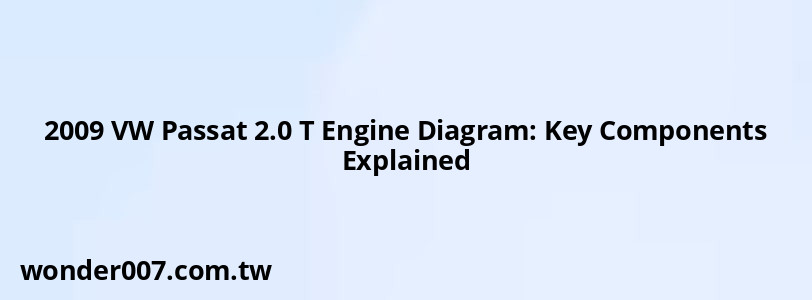2009 VW Passat 2.0 T Engine Diagram: Key Components Explained

The 2009 Volkswagen Passat 2.0 T features a turbocharged inline-four engine that is known for its efficiency and performance. Understanding the engine's layout and components is essential for maintenance and repairs. This guide provides a detailed overview of the engine diagram and key parts.
Overview of the 2.0 T Engine
The 2.0 T engine in the 2009 Passat is a turbocharged direct injection (TSI) engine, delivering approximately 200 horsepower. It is designed to provide a balance of power and fuel efficiency, making it a popular choice among drivers.
Key Components of the Engine
Here are some of the critical components found in the 2009 VW Passat 2.0 T engine:
- Intake Manifold: Directs air into the cylinders for combustion.
- Turbocharger: Increases engine power by forcing more air into the combustion chamber.
- Oil Filter: Removes contaminants from engine oil to ensure smooth operation.
- Coolant Bottle: Holds coolant for regulating engine temperature.
- Throttle Body: Controls the amount of air entering the engine.
- Fuel Injectors: Deliver fuel into the combustion chamber for mixing with air.
- Camshaft: Operates the intake and exhaust valves, crucial for engine timing.
- Crankshaft: Converts linear motion from the pistons into rotational motion to drive the vehicle.
- Timing Chain/Belt: Synchronizes the rotation of the crankshaft and camshaft.
Engine Layout
The layout of these components can be visualized in an engine diagram, which typically includes:
| Component | Location |
|---|---|
| Intake Manifold | Top of the engine |
| Turbocharger | Near the exhaust manifold |
| Oil Filter | Side of the engine block |
| Coolant Bottle | Front passenger side |
| Throttle Body | Attached to the intake manifold |
| Fuel Injectors | On top of the intake ports |
Maintenance Tips
Regular maintenance is crucial for keeping your VW Passat running smoothly. Here are some tips:
- Check Oil Levels Regularly: Ensure that oil levels are adequate to prevent engine wear.
- Replace Oil Filter: Change the oil filter during oil changes to maintain clean oil circulation.
- Inspect Coolant Levels: Keep an eye on coolant levels to avoid overheating issues.
- Monitor Turbo Performance: Listen for unusual noises from the turbocharger, which may indicate a problem.
FAQs About the 2009 VW Passat 2.0 T Engine
FAQs About 2009 VW Passat 2.0 T Engine
- What type of oil should I use?
Use synthetic oil that meets VW specifications for optimal performance. - How often should I change the oil?
It is recommended to change the oil every 5,000 to 7,500 miles under normal driving conditions. - What are common issues with this engine?
Common issues include oil leaks from valve covers and turbocharger performance problems.
Understanding your vehicle's engine layout and components can significantly aid in troubleshooting and maintenance efforts. Always refer to your vehicle's manual or consult with a professional mechanic for specific guidance related to repairs or replacements.
Related Posts
-
2017 Hyundai Elantra: Blind Spot Detection Features Explained
27-01-2025 • 222 views -
2004 VW Passat 1.8T Cooling System Explained
28-01-2025 • 284 views -
2009 Hyundai Santa Fe Oil Filter Replacement Guide
30-01-2025 • 197 views -
1995 Chevrolet Camaro Engine 3.4 L V6
31-01-2025 • 165 views -
Yale Forklift Warning Light Symbols Explained
26-01-2025 • 457 views
Latest Posts
-
2015 Chevy Traverse AC Recharge Port Location
01-02-2025 • 542 views -
How To Turn Off Paddle Shifters Mercedes
01-02-2025 • 516 views -
Rear Brake Caliper Piston Won't Compress
01-02-2025 • 472 views -
Are O2 Sensors Covered Under Warranty
01-02-2025 • 505 views -
Power Steering Fluid Leak On Passenger Side
01-02-2025 • 590 views
Popular Posts
-
Hino Warning Lights: Understanding Dashboard Alerts
26-01-2025 • 1025 views -
V12 Engine Costs: What You Need to Know
26-01-2025 • 836 views -
BMW X5: Fuel Tank Capacity and Specifications
28-01-2025 • 803 views -
Toyota Hiace: Fuel Efficiency Insights for 2025
26-01-2025 • 863 views -
EPC Light: Understanding Causes and Solutions
26-01-2025 • 1196 views
